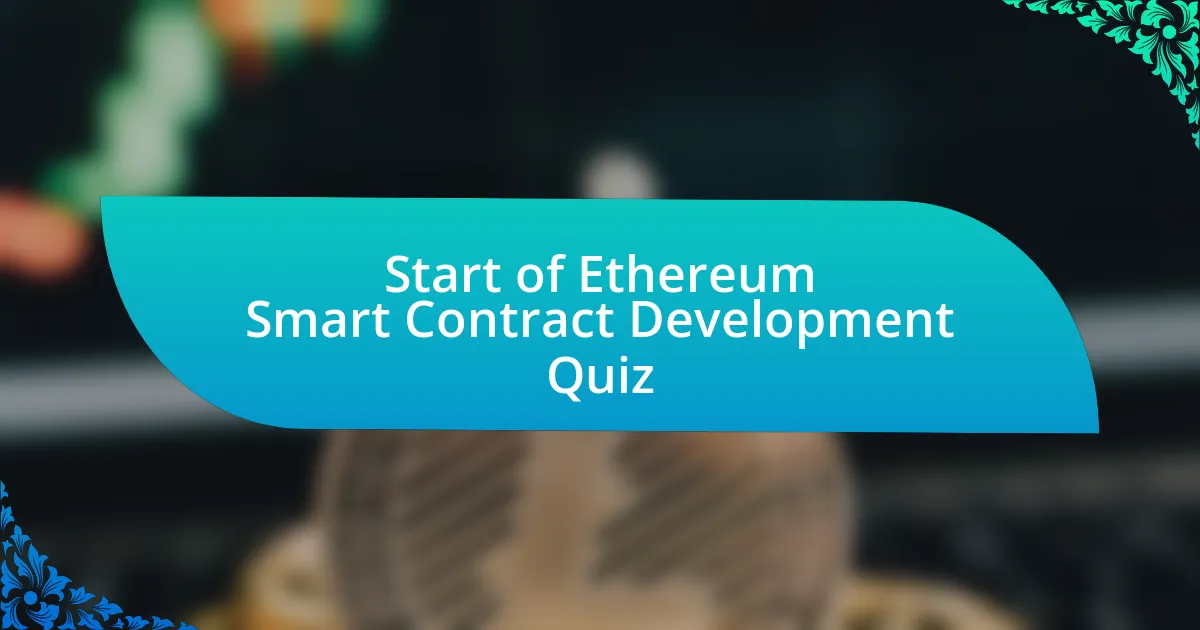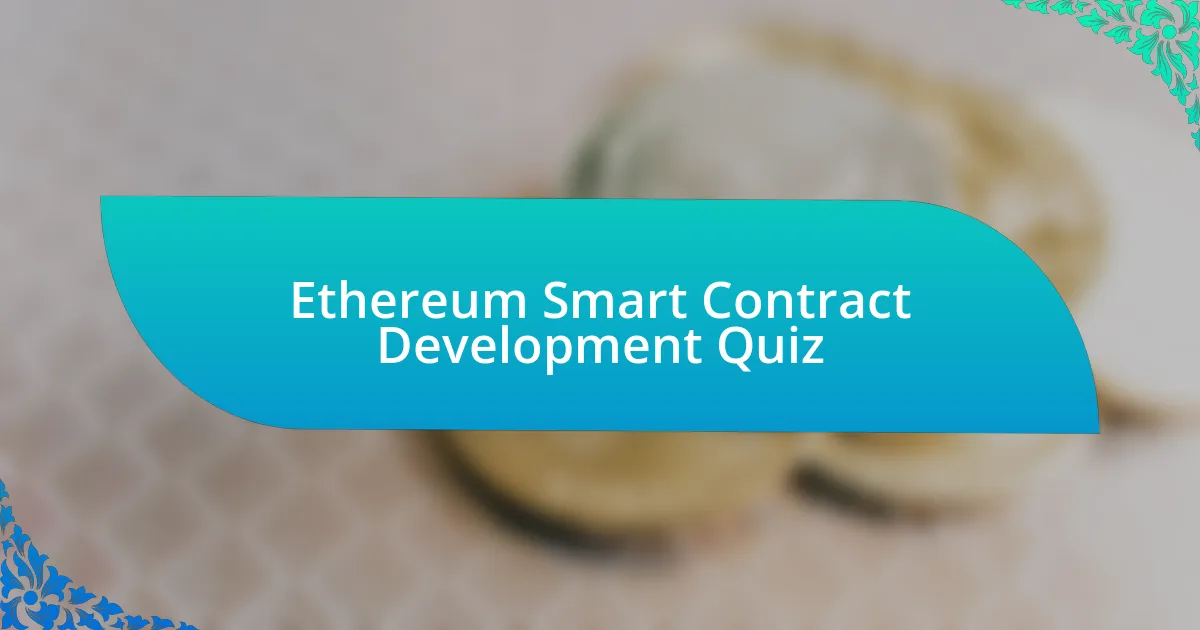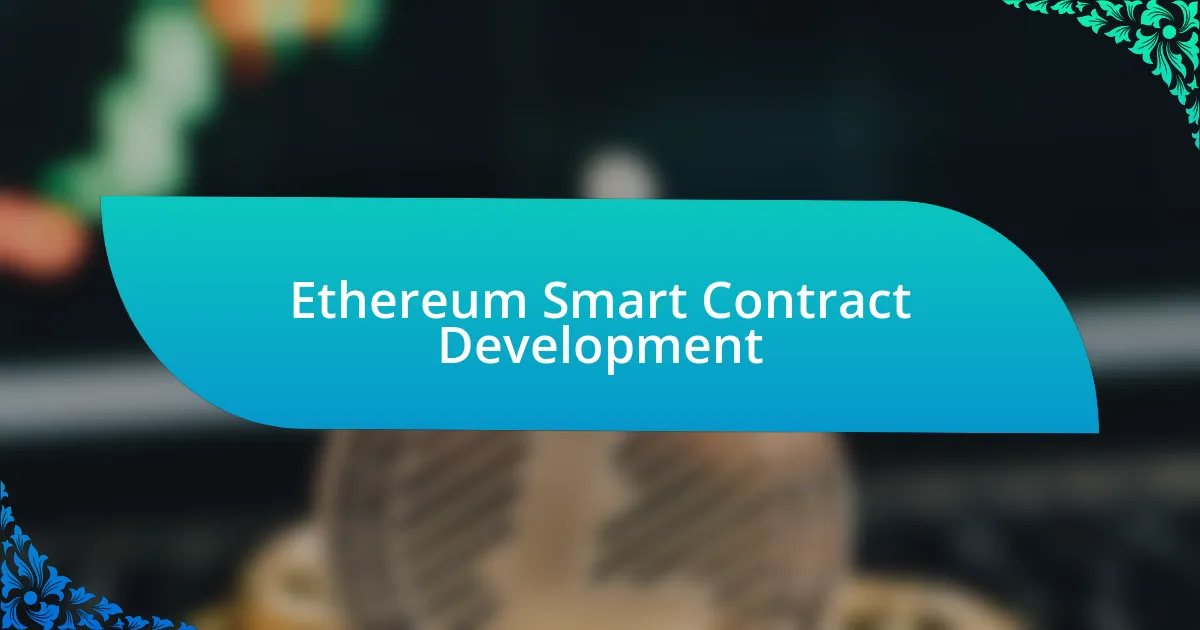
Start of Ethereum Smart Contract Development Quiz
1. What is the primary purpose of Solidity in Ethereum development?
- To store user data securely.
- To build web applications.
- To create smart contracts.
- To manage blockchain nodes.
2. How can developers test their smart contracts without spending Ether?
- Using a centralized database.
- Using a test network like Ropsten.
- Writing contracts in JavaScript.
- Deploying on the main Ethereum network.
3. What role does the Ethereum Virtual Machine (EVM) play in smart contract execution?
- Stores smart contracts on a decentralized server.
- Verifies user identity with cryptographic keys.
- Compiles smart contracts into bytecode for execution on the blockchain.
- Provides an interface for managing cryptocurrency wallets.
4. Which Ethereum development tool is known for its in-browser IDE capabilities?
- Web3.js
- Hardhat
- Remix
- Ganache
5. What does the term `Gas` refer to in the context of Ethereum transactions?
- Gasoline Cost
- Transaction Fee
- Processing Charge
- Storage Fee
6. What type of software is Truffle in the Ethereum development environment?
- A decentralized exchange platform for trading.
- An analytics tool for blockchain performance.
- A testing and development environment for Ethereum.
- A cryptocurrency wallet for Ether storage.
7. Which key is essential for accessing an Ethereum wallet?
- Seed phrase
- Private key
- Wallet address
- Public key
8. What is the main function of the Remix IDE?
- An Integrated Development Environment (IDE) for Ethereum smart contracts.
- A coding language for web development.
- A wallet for storing Ethereum tokens.
- A cryptocurrency exchange platform for trading Ether.
9. How do smart contracts on Ethereum maintain data integrity?
- They utilize cryptographic hashes and consensus mechanisms.
- They use manual code reviews for verification.
- They depend on user feedback for updates.
- They rely on centralized databases for storage.
10. What types of applications can be created using Solidity?
- Smart contracts
- Web browsers
- Video games
- Mobile apps
11. How does Ethereum handle transaction privacy in its public blockchain?
- No, all transactions are public.
- Transactions are encrypted on the blockchain.
- Only private transactions are recorded.
- Users can hide their transactions with a password.
12. What is the significance of using a test network like Ropsten?
- To mine real Ether without cost.
- To create fraudulent transactions easily.
- To limit user access to the Ethereum network.
- To test dApps and smart contracts without using real Ether.
13. What programming language is specifically designed for writing Ethereum smart contracts?
- Ruby
- Python
- Solidity
- JavaScript
14. Can Ethereum smart contracts modify their own state?
- Yes, Ethereum smart contracts can modify their own state.
- No, Ethereum smart contracts are immutable.
- No, they can only read their state.
- Yes, but only with external calls.
15. What is a common method for ensuring access control in smart contracts?
- Token standards
- Variable types
- Modifier functions
- Array structures
16. How do you debug smart contracts effectively during development?
- Using tools like Remix for debugging.
- Ignoring errors until deployment.
- Relying solely on manual testing.
- Writing extensive documentation for each line.
17. What is the relationship between denominating Ether and Gas in transactions?
- Gas is a type of digital asset within the Ethereum ecosystem.
- Ether is the currency used for payments in the network.
- Ether represents the data size of a transaction on the blockchain.
- Gas is the measure of computational work required for transactions.
18. How do you create a mapping data structure in Solidity?
19. What is a common recommendation for testing smart contracts?
- Beta testing.
- User feedback.
- Unit testing.
- Manual review.
20. What inherent feature does Ethereum provide that allows for decentralized application development?
- Private user profiles
- Static website hosting
- Centralized database access
- Smart contract functionality
21. How are fees determined for transactions on the Ethereum network?
- By the user`s account balance.
- Based on the network demand for transactions.
- Randomly assigned by the miners.
- By the amount of data in the transaction.
22. What does the term `unit testing` imply in the context of Solidity development?
- Optimizing the entire contract for gas usage.
- Creating user interfaces for dApps.
- Writing and running tests on individual functions of a contract.
- Deploying a contract to the main network.
23. In which ways can developers interact with Ethereum decentralized applications (dApps)?
- Uploading files to the cloud.
- Using Metamask to access dApps.
- Using VPN services for browsing.
- Writing HTML web pages.
24. Why might a developer choose to deploy a smart contract on a private network instead of the main Ethereum network?
- Faster transaction speeds across the network.
- Unlimited access for all users.
- Increased transaction fees and costs.
- Data privacy, permissions testing, and control.
25. What is the purpose of using events in smart contracts?
- To create new tokens in the blockchain.
- To store large amounts of data permanently.
- To notify external applications about significant changes in the contract state.
- To speed up the execution of smart contract functions.
26. What tool can developers use for automated testing of their Ethereum contracts?
- Ganache
- Hardhat
- Truffle
- Remix
27. How does the Ethereum blockchain achieve consensus among nodes?
- Delegated Proof of Stake
- Random Selection
- Proof of Work
- Centralized Authority
28. What is one major difference between Ethereum and Bitcoin?
- Ethereum supports smart contracts.
- Bitcoin has a fixed supply limit.
- Ethereum uses a proof-of-work system.
- Bitcoin transactions are irreversible.
29. How can a developer handle unexpected errors in a smart contract function?
- Ignoring the errors and continuing execution.
- Restarting the entire smart contract.
- Writing everything in comments for later review.
- Using try-catch blocks and error handling mechanisms.
30. What is the importance of bytecode in the context of Ethereum smart contracts?
- Bytecode is only used for storing data within the blockchain.
- Bytecode functions as a wallet for managing Ether.
- Bytecode is essential for executing smart contracts on the Ethereum Virtual Machine (EVM).
- Bytecode is primarily designed for user interface development.



